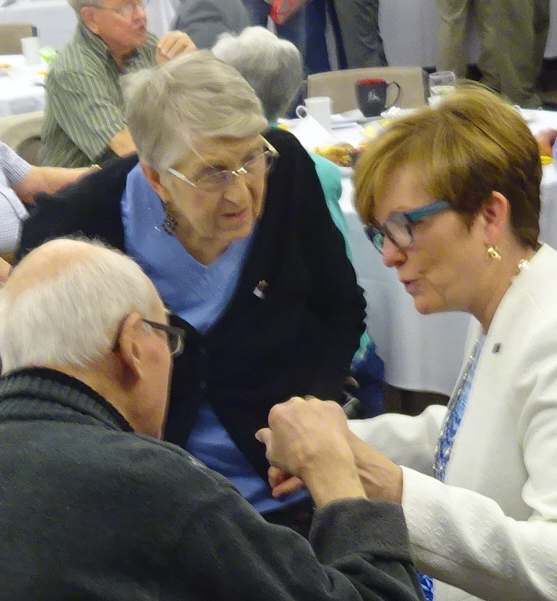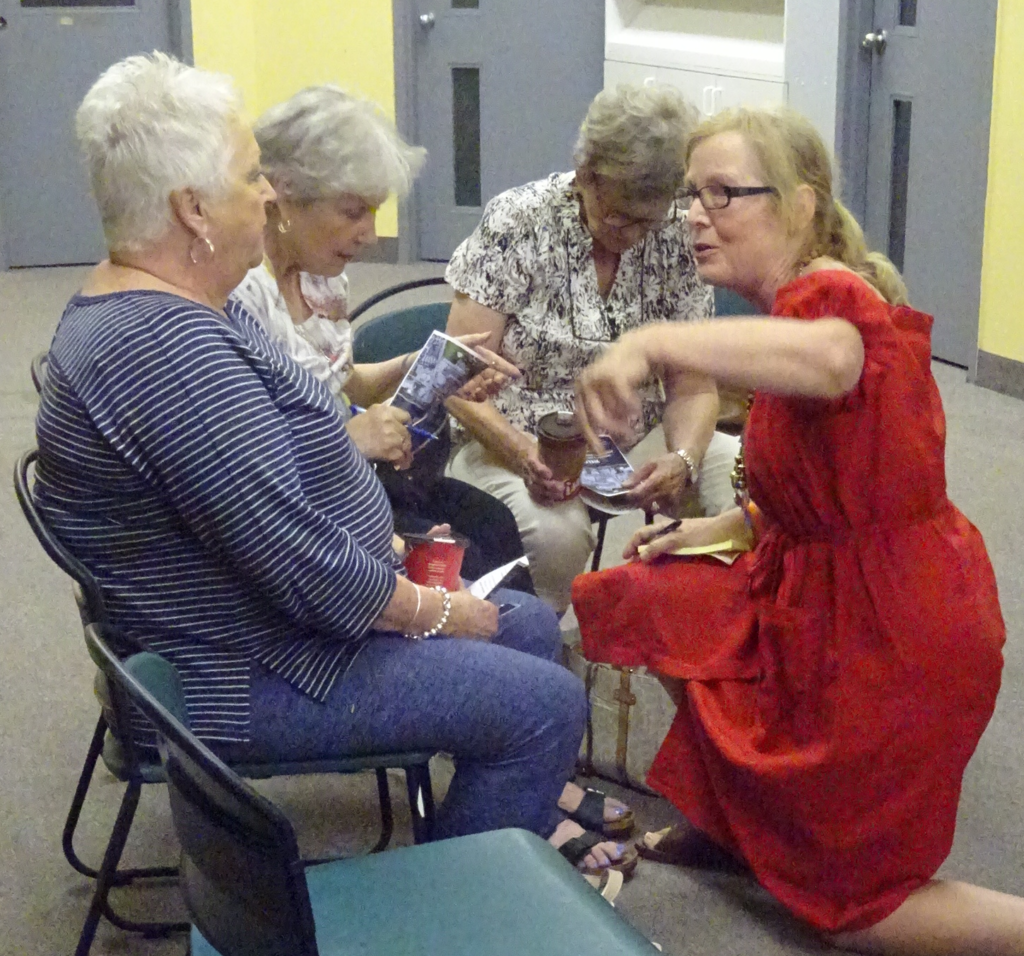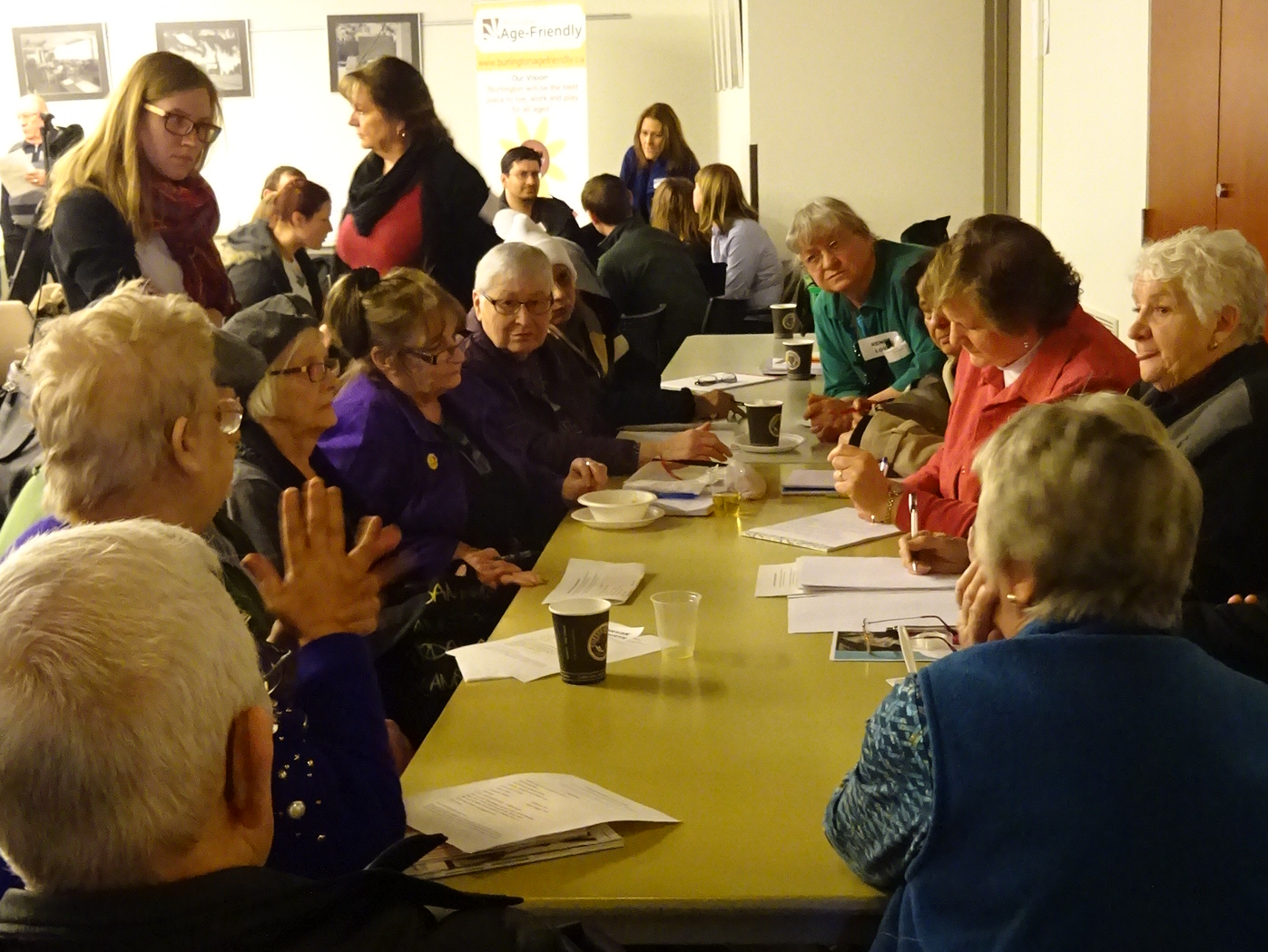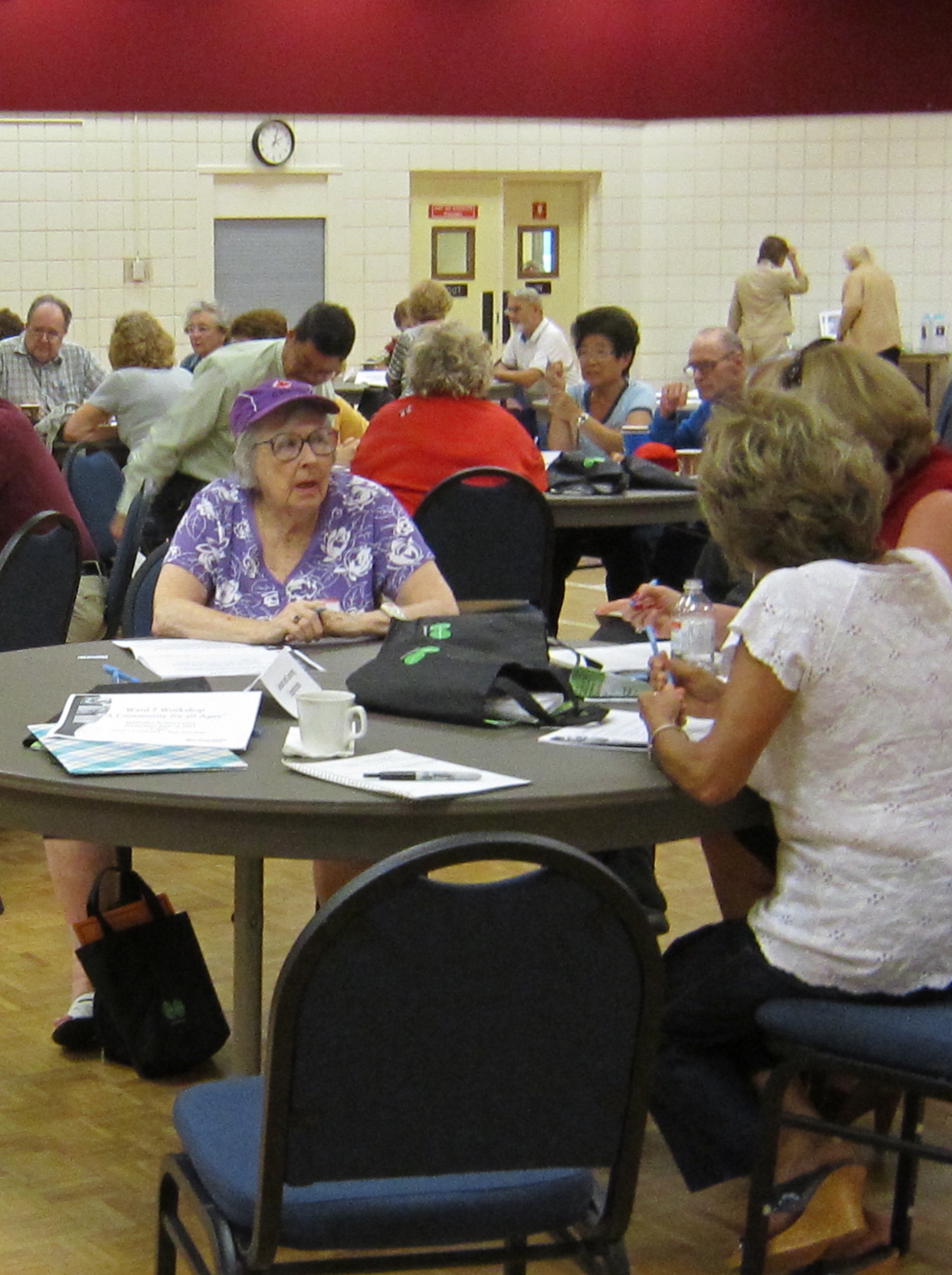 By Staff
By Staff
May 9th, 2022
BURLINGTON, ON
Part 2: Caregivers.
This Community Lens, the second in a two-part series on caregiving, will draw from the findings of a 2021 survey on the impacts of COVID-19 on caregivers.
The survey was carried out by the Ontario Caregiver Organization (OCO) deep into the second year of the pandemic, between September 24th and October 12th, 2021.
Released in November 2021, entitled, ‘Spotlight Report, The Impact of COVID-19 on Caregivers: Year Two’ , it is the second pandemic caregiver survey undertaken by the organization. Its first pandemic survey, ‘Spotlight on Ontario’s Caregivers COVID-19 Edition’, was released in December 2020.

Former Burlington MPP Eleanor McMahon speaking with seniors at a meeting in the Library.
The OCO defines caregivers as “ordinary people who provide physical and/or emotional support to a family member, partner, friend, or neighbour”. Funded by the Government of Ontario, the OCO is a nonprofit that was created in 2018 “to support Ontario’s estimated 3.3 million caregivers”.
In publishing this Community Lens, CDH intends to raise awareness of the experiences of caregivers, in our view, an increasingly important, but often overlooked, area of life for many people and families across Halton.
COVID-19 Impacts on Caregivers
Since the OCO’s first pandemic survey in December 2020, the findings from the 2021 survey indicate that many of the negative and difficult personal caregiver experiences deteriorated further. There were 801 “self-reported caregivers” aged 16 years and older who participated in the online survey between September 24 and October 12, 2021. As part of its research, the OCO also conducted a series of ten in- depth interviews alongside the online survey.
In the second year of the pandemic, caregivers reported increases in “feeling tired, anxious, overwhelmed, trapped, frustrated and unappreciated”. In fact, according to the 2021 survey findings, caregiver burnout was at record high levels.
While one in three caregivers in the 2021 survey reported that they had “no one to ask for help” if they needed a rest or if they became sick.
The climate of heightened anxiety around COVID-19 transmission, among other factors, impacted caregivers and care recipients, with 56% of caregivers reported worrying about “managing care recipient’s anxiety due to Covid-19”.
COVID-19 caused significant service and care support disruptions, which would have been felt disproportionately by caregivers who were already overstretched, such as those with smaller family and friend networks.

Mary Alice St. James talking to seniors during an election campaign.
The increased pressure on the healthcare system during the pandemic impacted 75% of caregivers who were required to take on “responsibilities that would otherwise go to a personal support worker or nurse”. Overall, caregivers reported that more time was spent caregiving during the pandemic, “61% say the hours they spend providing care has increased”. According to the 2021 survey, almost one in five carers (18%) were “caring for more than one person”. The pandemic not only created additional complexity for that group, but for many caregivers, 59% of whom said their responsibilities were more difficult in 2021 “than before the pandemic”.
The top three reasons that caregivers gave were:
“Being at home all the time, the care recipient is unable to get important social interaction (38%) Difficulty accessing the doctors and/or other healthcare professionals (36%)
Delayed/cancelled appointments require more time and effort in rescheduling (33%)”.
Enhanced health and safety protocols in hospitals and long-term care facilities, introduced to keep the most vulnerable safe from COVID-19 transmission, were nonetheless difficult experiences for many caregivers and recipients, particularly those that were already isolated and lonely pre-pandemic. Due to enhanced COVID-19 health and safety rules, “26% [of caregivers in the 2021 survey] had to send the care recipient to the hospital alone”.
Canadian caregivers also reported worse personal pandemic impacts than their global counterparts. A survey by Embracing Carers, released in 2021, found that, “70% of Canadian carers say that the pandemic has worsened their emotional/mental health, compared to 61% of the 12-country average” and “61% of Canadian carers say that the pandemic has worsened their physical health, compared to 46% of the 12- country average”.

Burlington has a very strong network of seniors who have clout that spreads throughout the Region of Halton. This crowd was focused on transit while the MP, Karina Gould and then ward 2 Councillor, now Mayor Burlington, Marianne Meed Ward look on.
Post-Covid Financial Pressures: Rising Living Costs to Impact Caregivers
Financial hardship exists among caregivers, just as it is experienced by individuals and families across our communities. The OCO 2021 survey reported that, “20% of caregivers took out a loan or a line of credit to help pay for the expense [of caregiving], up from 17%” in the 2020 survey. 9 It found that 45% “experienced financial hardships [in 2021], compared to 41% in 2020”, an increase of 4% during the two pandemic surveys. Perhaps a more concerning trend was that the 45% of caregivers experiencing financial hardship in 2021 was up 13% (from 32% in 2019). Moreover, the 2021 level of self-reported financial hardship (45%) is more than double the 22% reported in the 2018 survey.
The current rise in living costs being witnessed across the country will only serve to increase the financial hardship of many caregivers. In “January 2022, Canadian inflation surpassed 5% for the first time since September 1991”. 10 In February 2022, national average prices climbed further. Canada’s inflation level for February 2022 sat at 5.7% (12-month average, compared with February 2021).
Staple food items are increasing faster than the 5.7% inflation level. In February 2022 (compared with February 2021), fresh or frozen beef prices were up 16.8%, chicken was up 10.4%, and “dairy products and eggs were up 6.9%”. These macro economic price trends support the personal reflections of caregivers in the OCO 2021 survey: 47% of whom said that “there have been more costs related to providing care” during COVID-19.

Councillor Sharman has held two public sessions with Senior’s as part of his effort to understand their needs and develop policy that Council can put in place to serve this vital community.
Caregivers fortunate enough to have access to a motor vehicle are experiencing much higher price increases than the 5.7% inflation level. In February 2022, Canadians “paid 32.3% more at the pump compared with February 2021”. 14 Such fuel price increases are likely to put caregivers under increasing financial pressure, disproportionality impacting more rural and isolated caregivers and those with inadequate access to public transport. The associated tasks around providing caregiver support, some of which are heavily reliant on transport, such as attending doctors’ appointments, prescription runs, buying medical and care supplies, are now more expensive post-Covid.
Conclusion
This Community Lens showed that the negative experiences of caregiving during COVID-19 were exacerbated by a pandemic that affected service provisions, contributed to increased anxiety and burnout, impeded crucial social interactions, and increased financial pressures on caregivers.
Unfortunately, the post-COVID economic climate is unlikely to offer much respite for struggling caregivers in the months ahead. Gas and essential food item prices are fast outpacing Canada’s 31-year inflation high of 5.7%, which was announced for February 2022. 15 These post-COVID price increases, caused in part by higher “input prices and heightened transportation costs,” come on top of already increased costs that were associated with caregiving, as reported in the 2021 OCO survey.
If there is to be a positive takeaway from the pandemic it may be, as the CEO and board chair of the OCO put it in their opening remarks to the 2021 survey, “the expanded understanding of what caregivers do and why they are essential partners in care”. We hope this Community Lens series has contributed, in a small way, to this understanding, and helps shine a light on the role that an “estimated 131,624 Halton caregivers” play in supporting families, friends, and the wider healthcare and social system.
Further Resources for Caregivers
If you are a caregiver, or know someone who is, and would like further information around resources and support, we recommend visiting the Ontario Caregiver Organization website: https://ontariocaregiver.ca
As always, if you have any feedback about this Community Lens or about any of our other social policy and planning work, please reach out to data@cdhalton.ca
 Community Lens is prepared by Community Development Halton to disseminate and interpret important community data as it becomes available. For more information please contact us at data@cdhalton.ca or 905-632-1975
Community Lens is prepared by Community Development Halton to disseminate and interpret important community data as it becomes available. For more information please contact us at data@cdhalton.ca or 905-632-1975
Community Development Halton 3350 South Service Road
Burlington, ON L7N 3M6
905-632-1975 www.cdhalton.ca














